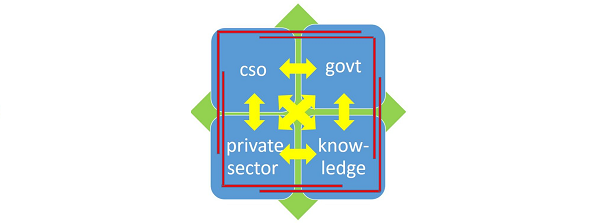Co-creating with research for sustainable development, a policy perspective

Developing economies are facing major, complex challenges to eradicate poverty, ensure food security and promote economic growth. As global community, we need to increase efforts to deliver on our Sustainable Development Goals (SDGs). As the Netherlands, we align ourselves with people in extreme poverty, suffering from hunger, living in dire circumstances. We continue to support them and invest in structural solutions “to end poverty in all its forms everywhere by 2030” (SDG-1). We work together with all that share this ambition, including in public-private partnerships (PPPs). Also, researchers we invite to join and work together with governments, the private sector and civil society. To this end, the Dutch government is supporting several research networks and programs, such as the Food & Business Knowledge Platform, and the Knowledge Platform on Inclusive Development Policy (INCLUDE). Researchers work in consortia with policy makers and practitioners to jointly work on challenges. Together they develop and make knowledge and practices available, and help drive innovative solutions for development.
Related to this work is the question how to best co-create knowledge? Even better, since research in this context is not the end in itself: how can programs be co-created with research?
For the co-creation in a PPP, many interrelationships have to be nourished, as illustrated in the figure. Let us focus on the relation between researchers and government officials, both with their own background. Government officials like myself work in complex and dynamic settings. We serve the political debate and address societal needs in ever-faster policy lifecycles. More and more, we design programs that have to deliver pre-defined, specific results. We operate in a transparent manner to ensure accountability to the public at large. Researchers on the other hand are often thinking in-depth and considering a longer time horizon. At the same time, they too are under pressure, to deliver scientific publications and profile their institute. Increasingly, they have to work to attract financial resources from the market.
Researchers are aware that government officials want to be enlightened with taylor-made information, insights and advice. The above mentioned research networks have websites that are targeting an audience beyond scientists, and make it standard practice to publish policy briefs and blogs. However, despite their attention for co-creation in existing programmes, researchers will have to invest more in better understanding the roles that governments play. One such role is facilitating multi-stakeholder cooperation to properly face complex challenges and achieve more impact. Researchers can link to this by providing objective facts & figures, and help identify common ground for interventions and change, for example between civil society and the private sector. Researchers could also help to build partnerships and assure that interests of all stakeholders are respected. If governments are eager to promote change, research can be responsive for example by taking the lead in innovations. If government take action to identify and implement normative standards, like laws, regulations and minimum criteria, knowledge is required on the gap between the given and desired situation. Research can also identify alternatives for (to be) illegal conduct or products. Obviously, vice versa governments have to make clear what they expect from research, in a frank and respectful dialogue on Roles, Responsibilities, Resources and Realism.
We are keen to make a difference with our work, to contribute to the reduction of hunger, job creation and better lives for people, with respect for nature and the environment. Let us continue to talk-this-talk, and walk-this-walk. Meanwhile, let us take sufficient time to reflect and be more explicit on the different roles and responsibilities we have as private sector, civil society, government and research. As such, we will be able to co-create more efficiently and achieve more impact for development.





